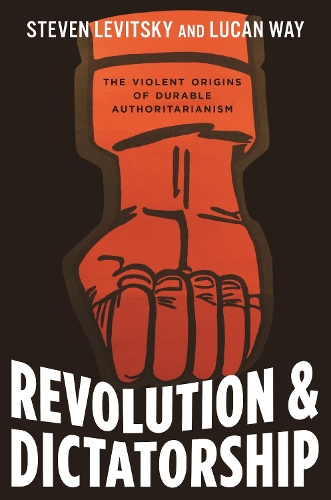
Revolution and Dictatorship: The Violent Origins of Durable Authoritarianism
(Hardback)
Available Formats
Publishing Details
Revolution and Dictatorship: The Violent Origins of Durable Authoritarianism
By (Author) Steven Levitsky
By (author) Lucan Way
Princeton University Press
Princeton University Press
1st February 2023
United States
Classifications
Tertiary Education
Non Fiction
Revolutionary groups and movements
Comparative politics
303.64
Physical Properties
Hardback
656
Width 155mm, Height 235mm
Description
Why the worlds most resilient dictatorships are products of violent revolution
Revolution and Dictatorship explores why dictatorships born of social revolution such as those in China, Cuba, Iran, the Soviet Union, and Vietnam are extraordinarily durable, even in the face of economic crisis, large-scale policy failure, mass discontent, and intense external pressure. Few other modern autocracies have survived in the face of such extreme challenges. Drawing on comparative historical analysis, Steven Levitsky and Lucan Way argue that radical efforts to transform the social and geopolitical order trigger intense counterrevolutionary conflict, which initially threatens regime survival, but ultimately fosters the unity and state-building that supports authoritarianism.
Although most revolutionary governments begin weak, they challenge powerful domestic and foreign actors, often bringing about civil or external wars. These counterrevolutionary wars pose a threat that can destroy new regimes, as in the cases of Afghanistan and Cambodia. Among regimes that survive, however, prolonged conflicts give rise to a cohesive ruling elite and a powerful and loyal coercive apparatus. This leads to the downfall of rival organizations and alternative centers of power, such as armies, churches, monarchies, and landowners, and helps to inoculate revolutionary regimes against elite defection, military coups, and mass protestthree principal sources of authoritarian breakdown.
Looking at a range of revolutionary and nonrevolutionary regimes from across the globe, Revolution and Dictatorship shows why governments that emerge from violent conflict endure.
'A sweeping historical analysis.' Dexter Roberts, Washington Post
'A clear and comprehensive analysis.' Cady Lang and Angela Haupt, TIME
Reviews
"Shortlisted for the Lionel Gelber Prize, Lionel Gelber Foundation"
"
A sweeping historical analysis.
"---Dexter Roberts, Washington Post"A clear and comprehensive analysis."---Cady Lang and Angela Haupt, TIME
"Two of the most prolific and respected scholars of democracy and dictatorship, Steven Levitsky and Lucan Way . . . bring together their immense regional and theoretical expertise in their new book, Revolution and Dictatorship. For those trying to understand where history is headed, their approach offers useful insights and lessons."---Sheri Berman, Foreign Affairs
"Clear and original. . . . Persuasive."---George Anderson, Literary Review of Canada
"An interesting and rigorous analysis of why so many autocratic states born of social revolutions from the USSR to China to Iran and so on prove immovable in the face of problems that would end normal regimes."---David Patrikarakos, The Spectator
Author Bio
Steven Levitsky is the David Rockefeller Professor of Latin American Studies, professor of government, and director of the David Rockefeller Center for Latin American Studies at Harvard University. His books include How Democracies Die and Transforming Labor-Based Parties in Latin America. Lucan Way is professor of political science at the University of Toronto. He is the author of Pluralism by Default. Levitsky and Way are the coauthors of Competitive Authoritarianism.
